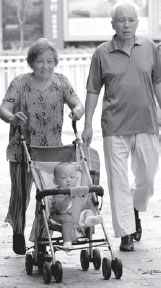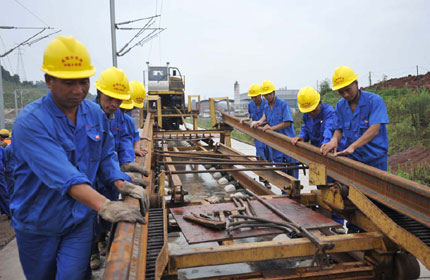China's elderly face oversized expectations
Updated: 2014-06-27 07:07
By Satarupa Bhattacharjya (China Daily)
|
|||||||||||
A brief smile escaped the wrinkled face of a Chinese woman as she looked at the sky left crimson by a setting sun. The elderly woman stood outside the gymnasium of a housing cluster, carrying a child's backpack and a longing in her eyes that seemed to reflect a desire to hold on to the view.
But an energetic grade-schooler appeared shortly by her side. He was thirsty after a swim and needed grandmother to promptly give him water to drink. Grandma, on the other hand, may have enjoyed the sweet solitude longer had he not interrupted. The two then made their way home as dusk veiled Beijing.
The woman is unknown tome, but she symbolizes an established social practice in China - that of second-generation parenting.
Society's expectations from grand parents here look oversized when China is compared with other populous nations where family ties may run as deep.
Yet, China's elderly people are trying their best to live up to them.
India, with a relatively younger population, is one country where grandparents play a role in raising grand-children but not to the extent visible in China. South Korea, Japan and Thailand are rapidly graying countries in the neighbor-hood where the elderly are also involved in such processes but not at the same scale, some research suggest.
It isn't considered unusual for the elderly in China to look after the houses of their children or bring up grand-children, a local acquaintance points out.
Younger couples often claim to shy away from hiring nannies due to expenses. Many parents, however, simply find the idea of grand-parents as caregivers very comforting.
Is the Chinese expression ken lao zu, or, "bite the old folks "when loosely translated, a good descriptor of the trend?
I came across its usage in relation to the alleged exploitation of elderly parents by adult children for money.
Here's the big data.
Last year, China had about 202.43 million people, at or above 60 years, accounting for 14.9 percent of the total population of about 1.37 billion, according to a government official. The municipality of Chongqing witnessed the highest concentration of elderly people in 2010, with 17.42 percent of the overall population.
When grandparents burn the midnight oil alongside teenagers who prepare for gaokao, the fiercely competitive national college entrance examination, nobody appears to mind. Retirees who volunteer at public transport hubs to keep crowds from turning chaotic are welcomed too. But some people grumble when the elderly take to group dancing on the streets or play mahjong over local beer and a few loud laughs. It's not just in cities; the countryside is also laden with expectations. The majority of aging people in many villages are tasked with caring for young children, toddlers included, after their parents leave to pursue urban jobs.
Raising about 61 million "left-behind" children seemingly requires at least as many grandparents, who occasionally get blamed for incompetence. Even at their age, with limited resources and physical energy, society hopes they can fill parental voids in a child's life.
Women, of course, bear the brunt of the deal.
That China's older population is "feminized" has been documented by ample government research. There were some 91.05 million women at 60 years or above on the Chinese mainland, according to the 2010 national census.
Experts Lin Tan and Jia Yunzhu from the Women's Studies Institute of China, a government affiliate, argued in the past that elderly women spend over twice the time than elderly men do on unpaid house hold work.
The All-China Women's Federation, the parent agency of the above institute, advocates a retirement age for women in government jobs of 60 years instead of 55. About 13 provinces have adopted a policy of retiring men and women at 60"at or above county or division levels", an official from the agency says.
The China National Committee on Aging, a Beijing-based representative body, predicts the country will have some 437 million old people in 2050.
Now, shouldn't the out-look make society more sensitive toward the elderly?
satarupa@chinadaily.com.cn
|
A retired couple in Nanjing, Jiangsu province, take care of their grandson. It is a common scene in China, where elderly people play a major role in raising grandchildren. China Photo Press |
(China Daily 06/27/2014 page20)
Today's Top News
China, Germany join hands to drive growth
Meet foreigner breed of workers
Product placement deal backfires
From Westlife to the East
Gambling costs World Cup fans their lives
US supports Ukraine's decision to suspend ceasefire
It's all about making a spectacle
China likely to see 7.5% growth in second quarter
Hot Topics
Lunar probe , China growth forecasts, Emission rules get tougher, China seen through 'colored lens', International board,
Editor's Picks

|

|

|

|

|

|






